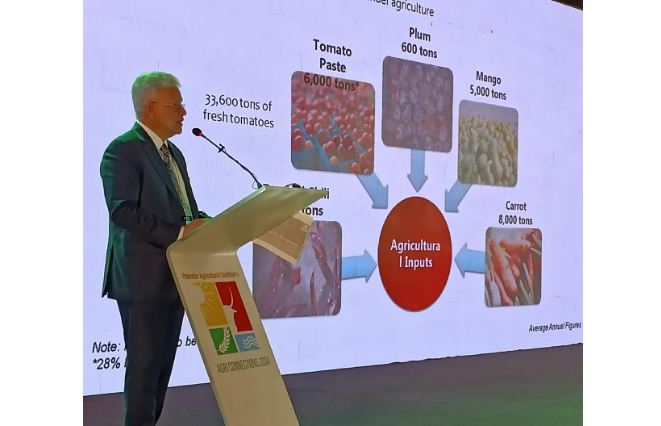Lahore, APR 24 /DNA/ – Pakistan will soon start exporting dairy products to China through a state-of-the-art farm developed in Sheikhupura to meet the export requirements of China.
This was revealed by Masaud Anwar, Secretary Livestock, Government of Punjab, at ‘Pakistan Agricultural Coalition’s Agri-Connections 2024’ at Expo Center here on Wednesday.
“A team of China Customs has recently visited our FAM Farm in Sheikhupura and unofficially approved Pakistan for exports of dairy products to China,” said Anwar.
Secretary Agriculture, Government of Punjab, Iftikhar Sahoo on the occasion said that private sector is the future of agriculture addressing the audience full of corporate and financial sector players.
“The new government has a vision for transformation our agriculture sector. So, the investment of Rs 100 billion has been planned in the agriculture sector for the next two years,” said Sahoo.
Also, he added, Rs 80 billion will be spent on the modernization of watercourses in the entire province in the next three years while the government is also in talks with institutes for moder equipment, partnership with academia for research, to fund research by private sector, and to provide paid internships to graduates from agricultural universities.
Sahoo said that despite being an agricultural country Pakistan imports worth of $5 billion food related items every year while facing serious challenges like crop productivity stagnation, decrease crop area, and loss of agri land to housing projects.
He added that food shortage is a serious issue as with the same agricultural productivity and increasing population the country will be facing the shortage of wheat by 6 million tons by 2033 while the country faces huge crop losses worth $1.5 every year due to outdated farming practices and low-quality farming the.
Abrar Hasan, Global CEO of National Foods Limited (NFL), talked about NFL’s ‘Seed to Table’ project which was launched in August 2023 in partnership with progressive farm-managing companies with a vision to reduce the country’s dependency on imported raw materials, empower local farmers and fortify Pakistan’s agri value chain.
“Even in its early stage, the ‘Seed to Table’ project has exceeded our expectations and we are incredibly proud of the results. The project has already saved USD 2mn with a realized localization potential of around USD 10mn,” said Abrar Hasan.
“By taking control of the entire supply chain, we’ve ensured a consistent supply of high-quality fresh tomatoes directly to NFL’s production facilities,” he added.
Earlier, CEO Pakistan Agricultural Coalition, Arif Nadeem in his welcome address said that their task is to make Pakistan’s agricultural sector globally competitive and issues raised in Agri Connections 2024 are to be addressed by government, policy makers.
“We should trigger things for the growth of our agriculture sector and I believe that better environment for investments emerges through this kind of conferences,” said Arif.
He informed that agricultural experts from China, Hungary, United Kingdom and other countries have participated in this conference to witness our knowledge building platform.
“As many as 35 small start-ups came up with their products in this conference and participated in our competition for start-ups in agriculture sector,” said Arif.
Panel discussion on how agriculture can salvage Pakistan’s economy was also held on the first day of the conference in which distinguished speakers from different sectors discussed the opportunities and options for the country in the agri sector.
Afaq Tiwana, CEO Farmers Associates Pakistan, said the corporate sector wants to invest in agri sector which gives us a hope.
“But some old policies like support in terms of subsidies for input are still existing which hamper growth in this sector. They are not relevant today and not helping the sector grow,” said Afaq.
He added that the need is to support viable farmers not small farmers while regulating output prices drives down the profitability of farmers, so the government shouldn’t do this,” reasoned Afaq.
Dr Iqbal Ahmad, Vice Chancellor University of Agriculture, said that private sector should invest in high efficiency irrigation and they have other lots of opportunities.
Naz Khan, Principal Country Officer, International Finance Corporation, said that by 2050 Pakistan’s population will be 400 million so agriculture sector is very important for the country.
“More than $2 billion is spent on the support of the agriculture sector by local government in terms of grants and subsidies, which can be used for development,” said Naz.
She added that there is a need to engage private sector for the uplift of the sector and make it export oriented through mechanization.

















